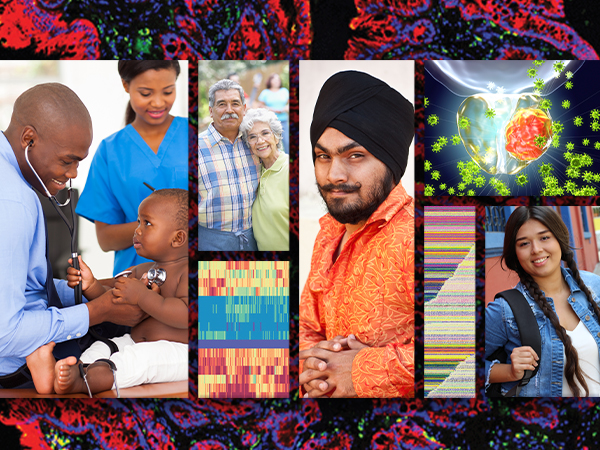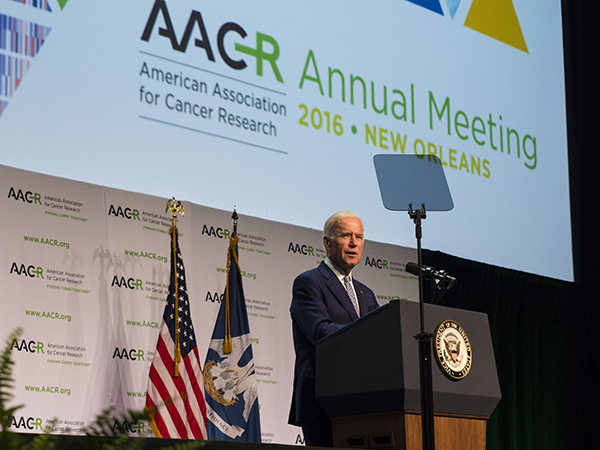Early-career Scientists Advocate for Federal Funding for Cancer Research
Each year, the American Association for Cancer Research (AACR) holds Early-career Hill Day, an event that connects AACR Associate members with U.S. lawmakers and their staff. This event is an exciting opportunity for early-career members to engage in advocacy at the federal level and educate lawmakers on the progress that’s been made against cancer.
Typically, Hill Day takes place in the offices of U.S. senators and representatives in Washington, D.C. Due to the constraints of the coronavirus pandemic, this year’s event was held virtually. Nonetheless, the AACR’s representatives made a strong case for robust, sustained, and predictable funding for biomedical research. In fact, they cautioned lawmakers that extra funding is needed to offset the effects of the pandemic, which forced many institutions to temporarily close their labs and redirect resources.
Two of this year’s Hill Day participants graciously shared their experience with Cancer Research Catalyst. Thanks to Katie M. Campbell, PhD, and Bernat Navarro Serer, PhD candidate, for sharing their stories.
Advocacy in the time of COVID-19
Guest post by Katie M. Campbell, PhD
University of California, Los Angeles
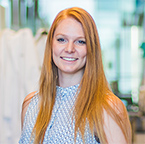
Campbell, PhD
On February 25, I had the opportunity to meet with representatives and senators from California and Washington to advocate for funding for the National Cancer Institute (NCI) and National Institutes of Health (NIH). It was my very first AACR Early-career Hill Day, and I can proudly say that I do not think it will be my last. Along with two of my Associate member colleagues, I was able to share the personal motivations driving my research, emphasize the importance of state and federal funding for research and training, and communicate the impact of the COVID-19 pandemic on the cancer research community.
Over the course of the day, my fellow Associate members Kristin Anderson, PhD, of the Fred Hutchinson Cancer Research Center and Dede Teteh, DrPh, of City of Hope Comprehensive Cancer Center, joined me in meetings with staffers from eight different congressional offices. We specifically requested $46.1 billion in NIH funding, with at least $7.6 billion allocated to the NCI, for fiscal year 2022. I was very excited to hear that our requests were consistently met with bipartisan agreement from all eight offices.
At the beginning of each meeting, I had the opportunity to share my story. Through grant and fellowship applications, I am very accustomed to describing the impact my mentors have had on my training and my passion for the science itself. With these meetings, however, I had the opportunity to communicate the impact cancer has had on my life and family. I have lost two parents to cancer—my father when I was 20 and my stepfather when I was 25—and these events remain an unfortunate source of motivation for my studies. I can also say that understanding the mechanisms of cancer biology and treatments allowed me to cope and strengthened my ability to support my family members during these times.
My story was met with equally unfortunate, but inspiring, stories of how cancer has affected my colleagues, congressional members, and their staffs. I really appreciate the reminder that cancer is the common enemy, and that it will continue to require a diverse army, including scientists, clinicians, advocates, and policymakers, to understand and conquer.
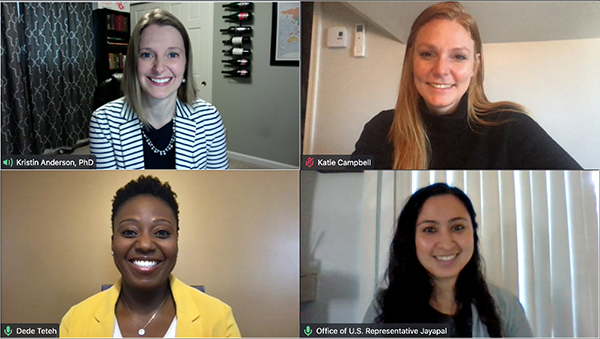
In preparation for Hill Day, I reviewed the documents from previous years, and they were filled with photos of Capitol Hill, suits and heels, and smiling faces of eager early-career researchers. This year, the photos will show screenshots from my 13-inch laptop, shoulders and collars of suit coats, and backgrounds from home offices and bedrooms. The smiling faces remained, but this does not diminish the disruption the COVID-19 pandemic has had on how we communicate, socialize, collaborate, and do science.
Things are stressful enough for early-career researchers in a non-COVID world, including the pressures to obtain funding, produce results, publish, and mentor. The pandemic introduced additional challenges, including hiring freezes, interrupted lab schedules and experiments, and event cancellations, taking away presentation and networking opportunities from trainees in transitional stages of their careers. While virtual meetings have, in some ways, brought our global scientific communities together, the pandemic has certainly taken away time and resources that are essential to establish a successful career in this field. Thus, we also requested $10 billion in emergency supplemental funding to overcome the impact of the pandemic. This is supported in the RISE Act, which proposes to provide extensions or alternative funding opportunities to researchers who are performing COVID-19 research or who have had research disrupted by the pandemic. I was especially encouraged to hear that our jobs as early-career researchers have been deemed essential, and it gave me hope to convey that our contributions to this field can only persist as long as our research and careers are supported.
My appointment as a postdoctoral fellow is in the David Geffen School of Medicine at the University of California, Los Angeles, in a laboratory affiliated with the NCI-designated Jonsson Comprehensive Cancer Center. My research is focused in cancer genomics, understanding how we can use genetic information about a tumor to learn about its biology and how it can be treated. I would also like to acknowledge that the tumor samples I study are collected from hundreds of patients across the country, treated at institutions within the NCI National Clinical Trial and SWOG Cancer Research Network. NIH and NCI funding have not only supported my training and science, but also supported the treatment and advances in therapeutics being offered to patients every day. The NIH is the primary funding source for biomedical research in this country, and the AACR Early-career Hill Day celebrates the personal, scientific, and clinical successes that directly result from these funds. As a scientist, it is my responsibility to communicate this to congressional members to ensure the perpetuity of this field and continued support for cancer research.
Finding a mission beyond the lab
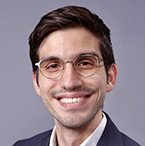
PhD candidate
Guest post by Bernat Navarro Serer
PhD candidate, Johns Hopkins University School of Medicine
We have all been touched by cancer, one way or another, and my family is no exception. Fortunately, we have seen the tremendous improvements in diagnosis and treatment of certain cancers, transforming deadly diseases into stories of perseverance and resilience. However, that isn’t the case for all cancer types. Working on pancreatic cancer has been eye-opening and has energized me with a sense of urgency. Many of these patients are still diagnosed at late stages of the disease, and the five-year survival rate is one of the lowest, at around 9 percent. Working in the lab and advancing my research on understanding pancreatic cancer invasion using patient samples has given me a different perspective on what it means to be a scientist. While focusing on solving complex and key projects is a major part of it, the role that scientists play transcends the walls of the lab.
Science is inherently political, as many decisions about which projects get funded are political decisions. Certainly, the impact and consequences of scientific discoveries are political. From the implications of new cancer treatment discoveries to the policies we adopt to fight climate change, these decisions depend on policymakers. Graduate school has taught me that being a scientist is more than just working at the bench. Being a scientist means standing up for science outside of the lab, and this can take several forms. One of them can be to educate the public on scientific information, a need that has been key during the COVID-19 pandemic. Another form of advocacy can be calling for evidence-based policies and funding for medical and cancer research.
This year, the AACR Early-career Hill Day looked different than usual because of the COVID-19 pandemic, but it was arguably more important than ever, as the pandemic has impacted grad students and cancer research. Having advocated with the AACR before, I know there is a certain magic and thrill while walking in the halls of Congress and bringing the message of the importance of medical and cancer research to policymakers. While this wasn’t there this time, advocating online highlighted the exceptionality of the situation and brought even more importance to the fact that we need to invest in medical and cancer research now to mitigate the effects of COVID-19 in the years to come.
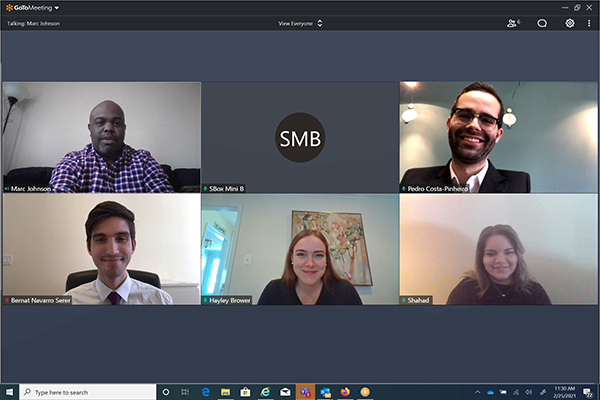
I was in a group with Pedro Costa-Pinheiro, MS, of the University of Virginia, and Marc Johnson, MPP, of the AACR, meeting with the state offices from Maryland and Virginia. During our meetings, we discussed the impact funding for the NIH and NCI has had on our training and our research. We discussed how investing in medical and cancer research isn’t just advancing science but also supporting the next generation of scientists, who will make the groundbreaking discoveries that may inform the development of innovative therapies and drugs. Our group asked for a $3.2 billion increase in funding for the NIH and at least $7.6 billion for the NCI to support cancer research. This year, additionally, we asked for at least $10 billion in emergency supplemental funding to support medical research impacted by the pandemic, as proposed in the RISE Act introduced by U.S. Representatives Diana DeGette (D-Colorado) and Fred Upton (R-Michigan) and Senators Ed Markey (D-Massachusetts) and Thom Tillis (R-North Carolina). This third request was urgent, as most labs stopped their research for three months during lockdowns, delaying many researchers’ work.
I was very pleased to see Congressional staff from both sides of the aisle supporting our request. There was a sense of importance in recognizing that funding research is more needed than ever. The offices were not only interested in our research, but really tried to understand what COVID-19 has meant for the scientific community.
I encourage graduate students to discover a role or a mission outside of the lab. Your opinion as a scientist, even when you are a graduate student, matters. Your perspective and your experiences will be heard and your voice is a powerful tool. Use it.


